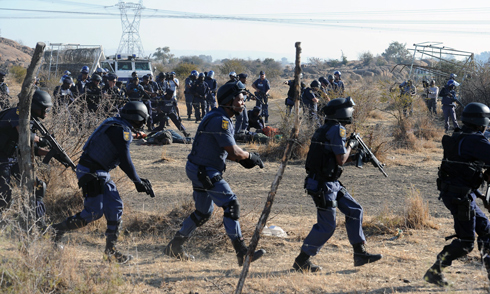Police kill more than 30 striking miners in South Africa
By John Gambrell Associated Press | Last updated: Aug 24, 2012 - 3:53:34 PMWhat's your opinion on this article?

Police officers open fire on striking mine workers Violence at Lonmins Marikana Platinum Mine, Rustenburg, South Africa - Aug 16 At least 30 are reported dead after violence broke out in the area as workers downed tools during an apparent wage strike at the Lonmin Marikana Platinum Mine and over clashes between rival miners unions. (Rex Features via AP Images)
|
JOHANNESBURG - South African police officers killed more than 30 striking workers at a Lonmin PLC platinum mine who charged a line of officers trying to disperse them, authorities said.
The shooting Aug 16 is one of the worst in South Africa since the end of the apartheid era.
Police ministry spokesman Zweli Mnisi told The Associated Press Aug 17 that more than 30 people were killed. He said an investigation into the shooting near Marikana, about 40 miles northwest of Johannesburg was underway.
The shooting happened after police failed to get the striking miners to hand over machetes, clubs and other weapons.
Some miners did leave, though others carrying weapons began war chants and soon started marching toward the township near the mine, said Molaole Montsho, a journalist with the South African Press Association who was at the scene.
The police opened up with a water cannon first, then used stun grenades and tear gas to try and break up the crowd, Mr. Montsho said.
Suddenly, a group of miners rushed through the underbrush and tear gas at a line of police officers. Officers immediately opened fire, with miners falling to the ground. Dozens of shots were fired by police armed with automatic rifles and pistols.
Images broadcast by private television station e.tv carried the sound of a barrage of automatic gunfire that ended with police officers shouting: “Cease fire!” By that time, bodies were lying in the dust, some pouring blood. Another image showed some miners, their eyes wide, looking in the distance at heavily armed police officers in riot gear.
It was an astonishing development in a country that has been a model of stability since racist White rule ended with South Africa’s first all-race elections in 1994. The shooting recalled images of White police firing at anti-apartheid protesters in the 1960s and 1970s, but in this case it was mostly Black police firing at Black mine workers.
It remains unclear what sparked the miners’ fatal charge at police. Mr. Mnisi, the police ministry spokesman, claimed the miners shot at police as well, using one of the weapons they stole from officers.
“We had a situation where people who were armed to the teeth, attack and killed others—even police officers,” the spokesman said in a statement. “What should police do in such situations when clearly what they are face with are armed and hardcore criminals who murder police?”
President Jacob Zuma said he was “shocked and dismayed at this senseless violence.”
“We believe there is enough space in our democratic order for any dispute to be resolved through dialogue without any breaches of the law or violence,” President Zuma said in a statement.
Barnard O. Mokwena, an executive vice president at Lonmin, would say only: “It’s a police operation.” In a statement earlier Aug. 16, Lonmin had said striking workers would be fired if they did not appear at their shifts the next day.
“The striking (workers) remain armed and away from work,” the statement read. “This is illegal.”
While the initial walkout and protest focused on wages, the ensuing violence has been fueled by the struggles between the dominant National Union of Mineworkers and the upstart Association of Mineworkers and Construction Union. Disputes between the two unions escalated into violence earlier this year at another mine.
Mining drives the economy of South Africa, which remains one of the world’s dominant producers of platinum, gold and chromium. Lonmin is the world’s third largest platinum producer and its mine at Marikana produces 96 percent of all its platinum. The violence has shaken the precious metals market, as platinum futures ended up $39, or 2.8 percent, at $1,435.20 an ounce in trading Aug. 16 on the New York Mercantile Exchange.
Lonmin stock plunged 6.76 percent the day of the shooting on the London Stock Exchange. The company’s stock value has dropped more than 12 percent since the start of the unrest.
INSIDE STORIES AND REVIEWS
-
-
About Harriett ... and the Negro Hollywood Road Show
By Rabiah Muhammad, Guest Columnist » Full Story -
Skepticism greets Jay-Z, NFL talk of inspiring change
By Bryan 18X Crawford and Richard B. Muhammad The Final Call Newspaper @TheFinalCall » Full Story -
The painful problem of Black girls and suicide
By Charlene Muhammad -National Correspondent- » Full Story -
Exploitation of Innocence - Report: Perceptions, policies hurting Black girls
By Charlene Muhammad -National Correspondent- » Full Story -
Big Ballin: Big ideas fuel a father’s Big Baller Brand and brash business sense
By Bryan Crawford -Contributing Writer- » Full Story






 Click Here Stay Connected!
Click Here Stay Connected!








